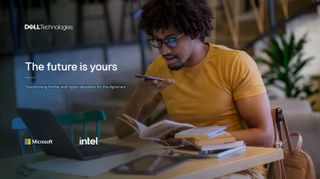Digital literacy is as important as reading and writing, Vodafone claims
A study from the company found that half of 18-24-year olds have limited access to a laptop, tablet or PC

Digital literacy is becoming as important as reading and writing for young people’s future life prospects, a new report from Vodafone has found.
Limited access to an internet-connected device, or a lack of skills to use one, is preventing those entering the job market from attending online lessons or exams, applying for jobs, and gaining the necessary digital skills for many of today’s roles.
Almost a third (29%) of respondents polled by Vodafone and WPI Strategy said that they had to share a laptop, tablet or PC for work, education or leisure in the past year, with families having to choose which child gets to attend an online class. This number was higher among those aged between 18 and 24, with one in two (50%) being forced to share a device, resulting in limited access to education or work prospects.
In the last year, it's not only education and working that has shifted online. With the UK government aiming to digitise many of its services, those with limited access to a device or digital skills are finding it increasingly difficult to renew their passport or driving licence, or to view National Insurance contributions and HMRC correspondence. Vodafone’s report found that 19% respondents don’t have access to essential online public services, with a quarter (25%) saying they only had access some of the time.
The disparity was especially evident when comparing socio-economic groups: 68% of those in the lowest socio-economic group said they had access to essential services, while those in the most privileged had the highest rate of access at 89%.
Commenting on the findings, Vodafone UK CEO Ahmed Essam said that “the consequences of living without connectivity or the skills needed to access digital services are huge”.
“Digital literacy is essential to the life chances of everyone in the UK. Access to technology, connectivity and the digital skills needed for many of today’s jobs is critical,” he said, adding that Vodafone is calling on “the Government, businesses, charity partners and civil society to work together to create a blueprint to address the digital divide once and for all”.
Get the ITPro. daily newsletter
Receive our latest news, industry updates, featured resources and more. Sign up today to receive our FREE report on AI cyber crime & security - newly updated for 2024.
Julian Knight MP, chair of the DCMS Select Committee and Chair of the APPG for New and Advanced Technologies, said that he welcomes Vodafone’s report “for opening up the discussion on improving digital skills and access”.
“It is now clearer than ever that digital skills and the ability to be connected is a vital part of our day-to-day lives. The pandemic has shown how all of us rely on the online world to stay connected as school children had their lessons online, parts of the workforce worked remotely and we used the internet to stay connected to loved ones,” he added.
Having only graduated from City University in 2019, Sabina has already demonstrated her abilities as a keen writer and effective journalist. Currently a content writer for Drapers, Sabina spent a number of years writing for ITPro, specialising in networking and telecommunications, as well as charting the efforts of technology companies to improve their inclusion and diversity strategies, a topic close to her heart.
Sabina has also held a number of editorial roles at Harper's Bazaar, Cube Collective, and HighClouds.






